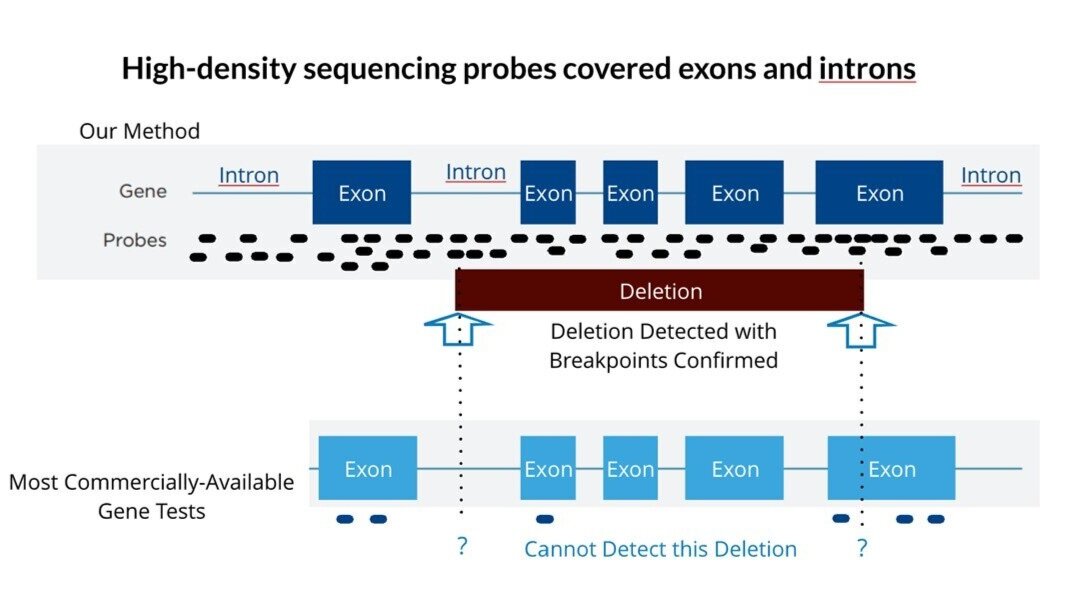Rainbow Cardio 4000™ Heart Health Test
Dual Whole Exome Sequencing & Copy Number Variant Sequencing Test
Rainbow Cardio 4000™
Introduction
Dual Sequencing Approach
Cardio genetic predisposition is genetic variation typically inherited from a patient's parent, and increases the likelihood of developing cardio disorders, including cardiomyopathy, heart arrhythmias (irregular heartbeats), familial hypercholesterolemia, etc. Certain mutations can greatly increase the risk of developing heart disorders while others may have much smaller effects.
Most cardio genetic tests do not detect copy number variants because challenging sequencing methods and bioinformatics analysis capacities must be developed and validated using a large body of patient samples.
These copy number variants are almost always pathogenic (highly likely to cause a heart disorder). If these are not reported, patients predisposed to high heart health risks may receive false-negative results.
We use a high-density sequencing probe coverage of both introns and exons of 30 key cardio genes, coupled with advanced bioinformatics specifically validated to detect these mutations, to determine these copy number variants.
Simultaneously, we also perform whole exome sequencing to report newly-discovered cardio gene mutations, to provide the most comprehensive detection of both well-known and novel mutations for each patient.
The two sequencing tests are performed simultaneously at two separate CLIA-certified and CAP-accredited laboratories.
Hereditary Cardio Risks
Exome sequencing test can determine if a patient has increased risk of multiple types of cardio disorders. This increased risk can often be managed by monitoring and preventive medications. Family members of an individual who carries a pathogenic cardio mutation may also consider testing to clarify their own risk.
Common Heart Attack Risks
As an option, polygenic risk associated heart attack and stroke can also be determined.
Copy Number Variant (Large Genomic Rearrangement) Detection
Examples of Hereditary Heart Health Conditions
Determine genetic mutations in 20,000 genes
Specifically analyze 4000 genes associated with hereditary heart health conditions and genetic disorders that can cause heart disorders
Test covers
Hypertrophic cardiomyopathy
Dilated cardiomyopathy
Left-ventricular non-compaction cardiomyopathy
Restrictive cardiomyopathy
Arrhythmogenic-right-ventricular cardiomyopathy
Long QT syndrome
Short QT syndrome
Brugada syndrome
Catecholaminergic-polymorphic-ventricular tachycardia
Ehlers-Danlos syndrome (vascular)
Familial-thoracic-aortic-aneurysms and dissections
Loeys-Dietz syndrome
Marfan syndrome
Familial hypercholesterolemia
Optional Pharmacogenomic Test to Determine Statin Adverse Drug Reactions. This test determines if you are an abnormal metabolizer of a number of commonly-used statins, helping your physician to choose the right cholesterol-lowering drug for you.
Optional Heart Attack Risk Assessment Test. Your sample can also be genotyped at a CLIA-certified and CAP-accredited laboratory for Asian-specific, polygenetic risk assessment of heart attack and stroke.
Test Descriptions
Two-in-One Test
Whole Genome Sequencing Test
This is a multi-cardio-disorder test designed for heart disease patients and apparently-healthy individuals without heart disease symptoms or family histories
In addition to exome-wide analysis of 20,000 genes, we also perform specific, in-depth analysis for genetic variations in over 2500 genes, covering over 4000 hereditary heart disorders and cardiovascular abnormalities.
Pathogenic variants and variants of uncertain clinical significance (VUS) in genes associated with patient’s symptoms will be reported
Duplication, insertion, deletion and single-nucleotide variant analysis included
Whole-exome based copy number variants (CNV) are also included
This test also preemptively determines the risks of developing a wide range of hereditary cardio disorders for asymptomatic individuals, such as relatives of heart disease patients who are confirmed carriers of a cardio gene mutation.
Copy Number Variant Sequencing Test on 30 “Critical” Heart Health Genes
Copy Number Variants (CNVs) are frequently pathogenic (disease causing). Yet, many cardio gene sequencing tests do not include these CNVs because it is very difficult to detect and confirm CNVs simultaneously from a large number of genes.
High-density sequencing probes are used to cover introns and exons of 30 medically-actionable cardio genes, to enable detections of CNVs
Clinically-validated bioinformatics are used to specifically determine these CNVs
Our partner laboratory has been using this test for thousands of Asian, Caucasian, Hispanic, and other ethnic-specific patients and asymptomatic individuals.
Test Process
The process starts with a physician office visit. The clinician will order the test for the patient.
Clinical whole exome sequencing at 150X-200X coverage is performed at U.S. CAP-accredited or CLIA-certified laboratory.
Copy number variant sequencing is simultaneously performed at a separate U.S. CAP-accredited or CLIA-certified laboratory.
Non-invasive test - Two buccal swabs are needed for this two-in-one test. Alternatively we also accept two blood tubes (3mL EDTA).
Optional risk assessment test for heart attack and stroke is performed using high-density DNA array genotyping technologies.
Optional pharmacogenomic test is performed using next-generation sequencing methods.
Benefits Of Whole Exome Sequencing Test
Recently discovered gene variants, usually not covered by simple gene testing (1-300 genes), will be included
Chinese, East Asian and South Asian specific variants, often not reported (or with conflicting classifications) in ClinVar and other international databases, will be carefully reviewed by Rainbow’s clinical teams.
Rainbow's triple clinical interpretation approach (US, Israeli and UK bioinformatics, clinical geneticists and medical teams) has substantially increased our diagnostic yield for Asian, Caucasian and mixed-race patients compared to diagnostic yields reported in the literature.
Family can subsequently order an expanded interpretation report associated with additional disorders or symptoms not related to heart disorders.
Is This Test Right For You?
The Rainbow Cardio 4000 Heart Health Test may be appropriate for
Patients who already have heart disease symptoms or complex clinical presentations with suspected genetic etiologies associated with hereditary heart disorders
Healthy individuals, especially relatives of heart disease patients who are confirmed to carry a cardio gene mutation. These individuals may want to understand their future risk of developing hereditary cardio disorders
Individuals with a family history that suggests an inherited heart disorder risk
Individuals with several close relatives with the same type of heart disorder
We provide free referrals to physicians with substantial clinical genetic experience for pre- and post-test consultation.

